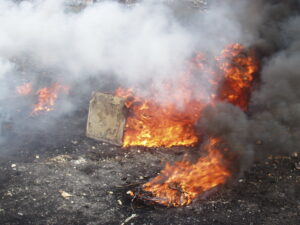Ghanaians urged to reduce greenhouse emissions to help protect the environment
 The Deputy Director of the Environmental Protection Agency (EPA) in Western Region, Mr. Kwadwo Opoku-Mensah, has reiterated the need for citizens at all levels in the communities to make it a duty to reduce greenhouse emissions and its effects on climate change in the country.
The Deputy Director of the Environmental Protection Agency (EPA) in Western Region, Mr. Kwadwo Opoku-Mensah, has reiterated the need for citizens at all levels in the communities to make it a duty to reduce greenhouse emissions and its effects on climate change in the country.
He noted that awareness creation and Behaviour change were very critical in efforts to reduce methane gases… “We should make conscious efforts to reduce waste. Ask yourself, what can I do to stop greenhouse gases, like open burning,” he added.
Methane, a hydrocarbon, is a primary component of natural gas and greenhouse gas (GHG) that affects the earth’s temperature and climate change.
Mr Opoku-Mensah gave the advice at a stakeholder’s engagement on natural resource and environmental governance.
The stakeholders discussed climate change and adaptation plans at an event organized by Friends of Nation (FON) with supports from Oxfam Ghana in Takoradi in the Western Region.
He said greenhouse emitting activities were associated with fossil fuel for production of energy, production of materials – steel, cement, chemical, production of food, land clearing, deforestation, waste landfills and incineration and “All these are drivers of climate change. We can’t say we will not produce food, build houses, generate electricity for lights, use cars. These are basic needs and what we desire.”
He said health, agriculture, forest, water resources and energy supply sectors suffered from effects of climate change.
Mr. Opoku-Mensah suggested mitigation measures like reducing and banning, capture and storage, maintaining and enhancing forest while adaptation measures should include protection or tapping opportunities to reduce climate.
The use of policy and legal and institutional framework like the National Climate Change Adaptation Strategy (NCCAS) and the role of stakeholders were important.
“Priority adaptation programmes should include increasing resilience to climate change impacts, identifying and enhancing early warning systems, alternative livelihoods for the poor and vulnerable and enhancing national capacity to adapt to climate change through improved land use management.
The manifestation of climate change impact, he said, was clear in the lives of people, stressing “the national strategy must alleviate communities from worsening effect of climate change.”
Participants suggested that the government must show much commitment to stop illegal mining and lumbering in forest reserves, intensify re-afforestation, encourage use of solar and other renewable sources of power and check dumping of waste.
Source: GNA

There is a need to educate the citizens of Ghana on the need to reduce and handle waste.
There should be more investment in the recycling of waste materials, instead of burning these papers and plastic waste they can serve as raw materials to produce eco-friendly products. Food waste can be used to produce manures for crop production.